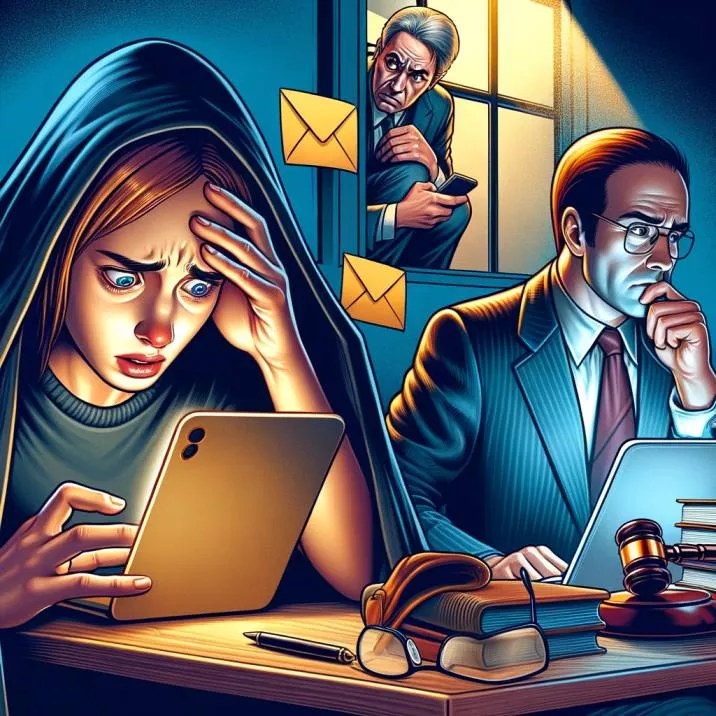This article talks about Legal Protection For Women In Online Harassment Cases. In today’s digital age, the internet has become a central part of our lives. However, this digital expansion has also led to a significant increase in online harassment cases, with women often being the primary targets. Recognizing the severity of this issue, Indian law has evolved to provide robust legal protections for women facing online harassment. This article aims to shed light on these protections, emphasizing the importance of understanding and utilizing them effectively.
Understanding Online Harassment
Online harassment encompasses a range of behaviors aimed at intimidating, controlling, or harming an individual through digital platforms. For women, this can include unsolicited messages, cyberstalking, identity theft, and the non-consensual sharing of intimate images. Such actions not only violate personal boundaries but also have profound psychological impacts.
Legal Protection for Women in Online Harassment Cases: A Guide Under Indian Law
India has taken significant steps to address online harassment through various legal provisions. The Information Technology (IT) Act, 2000, and amendments to the Indian Penal Code (IPC) are at the forefront of this battle, offering a legal basis for victims to seek justice.
Key Provisions and Acts
- Section 66A of the IT Act: Although struck down by the Supreme Court for being unconstitutional, its initial intention was to punish sending offensive messages through communication services.
- Section 66E of the IT Act: Penalizes the violation of privacy, including capturing, sharing, or publishing images of a person’s private areas without consent.
- Section 67 of the IT Act: Addresses the electronic publication or transmission of sexually explicit material.
- Sections 354A, 354D of the IPC: Respectively criminalize sexual harassment and stalking, which can apply to online behaviors as well.
How to Seek Legal Recourse
For women facing online harassment, knowing how to navigate the legal system is crucial. The process typically involves filing a complaint with the cybercrime unit of the police. Here’s a simplified guide:
- Collect Evidence: Save all relevant communications, such as emails, messages, and screenshots of the harassment.
- File a Complaint: Approach the cybercrime department of your local police station or use online platforms like the National Cyber Crime Reporting Portal.
- Legal Representation: Consider hiring a lawyer who specializes in cyber law to guide you through the legal process.
Support Systems and Resources
Several NGOs and women’s rights organizations offer support and advice to victims of online harassment. They can provide legal counseling, psychological support, and assistance in filing complaints.
The Role of Social Media Platforms
Social media platforms have their mechanisms to report and block users engaging in harassment. While this is a preliminary step, it’s crucial to follow through with legal action to ensure accountability.
The Importance of Awareness and Education
Educating women about their legal rights and the available protections against online harassment is vital. Awareness campaigns, workshops, and educational programs can empower women to stand against cyber abuse confidently.
Encouraging Reporting and Action
The stigma and fear associated with online harassment often discourage victims from coming forward. Encouraging open discussions and ensuring confidentiality in legal proceedings can significantly help in overcoming these barriers.
The Road Ahead
While the legal framework in India provides mechanisms to combat online harassment, continuous efforts are needed to strengthen these laws and their enforcement. Advocacy for stricter regulations, faster legal proceedings, and more significant support for victims is essential for creating a safer online environment for women.
Conclusion
The digital world should be a safe and inclusive space for everyone, free from harassment and abuse. By understanding and utilizing the legal protections available under Indian law, women can take significant steps towards safeguarding their online presence. It’s not just about fighting back against harassers; it’s about building a digital community that respects and protects its members’ rights and dignity.
FAQs: Legal Protection For Women In Online Harassment Cases
1. What constitutes online harassment?
Online harassment includes unwanted messages, cyberstalking, identity theft, sharing intimate images without consent, and any digital behavior intended to intimidate or harm an individual.
2. Are there specific laws in India against online harassment?
Yes, India has laws under the Information Technology (IT) Act, 2000, and the Indian Penal Code (IPC) that address various forms of online harassment.
3. Can sharing someone’s personal photos without consent be legally challenged?
Absolutely. Sharing personal photos without consent is a violation of privacy and is punishable under Section 66E of the IT Act.
4. What should I do if I’m a victim of online harassment?
First, save all evidence of harassment. Then, file a complaint with the local police or through the National Cyber Crime Reporting Portal.
5. Is cyberstalking considered a crime in India?
Yes, cyberstalking is a criminal offense under the IPC, particularly under sections dealing with stalking and sexual harassment.
6. Can I report online harassment anonymously?
Yes, certain platforms and the National Cyber Crime Reporting Portal allow for anonymous reporting of cybercrimes.
7. What is Section 67 of the IT Act about?
Section 67 penalizes the electronic publication or transmission of sexually explicit material without consent.
8. How can I report online harassment on social media?
Most social media platforms have reporting mechanisms that allow you to report profiles or content that is harassing or abusive.
9. Do I need a lawyer to file a complaint against online harassment?
While not mandatory, consulting a lawyer specialized in cyber law can help navigate the legal process more effectively.
10. Are there any organizations that support women facing online harassment?
Yes, several NGOs and women’s rights organizations offer support, legal counseling, and assistance in filing complaints.
11. What evidence is needed to support a complaint of online harassment?
Collect all relevant communications, such as emails, messages, screenshots, and any other documentation of the harassment.
12. Can men be victims of online harassment under these laws?
Yes, while these laws protect everyone, the focus here is on women due to the higher prevalence of harassment cases against them.
13. Is it possible to take legal action against someone from another country?
Yes, it’s possible, but it can be more complicated. International cooperation may be required to address the issue.
14. What happens after I file a complaint about online harassment?
The cybercrime unit will investigate your complaint, which may lead to legal action against the perpetrator.
15. How long does it take to resolve an online harassment case?
The duration can vary widely depending on the complexity of the case and the efficiency of the legal system.
16. Can online harassment lead to jail time for the perpetrator?
Yes, depending on the severity of the offense and the specific laws violated, perpetrators can face jail time.
17. What is the role of internet service providers in addressing online harassment?
Internet service providers can take action against users violating their policies, including removing content or suspending accounts.
18. Can victims of online harassment receive compensation?
Yes, courts can award compensation to victims for the harm suffered due to online harassment.
19. Is verbal abuse online considered harassment?
Yes, verbal abuse, including threatening messages or defamatory comments, is considered online harassment.
20. How can I protect my privacy online to avoid harassment?
Use strong, unique passwords, adjust privacy settings on social media, and be cautious about the personal information you share online.
21. Can blocking a harasser be enough to stop online harassment?
Blocking can be an immediate step to stop harassment from a specific account, but it may not address broader issues or prevent further harassment from other accounts.
22. Are there any preventive measures against online harassment?
Educating yourself and others about online safety, using privacy settings effectively, and being aware of legal protections can help prevent harassment.
23. What if the police do not take my complaint seriously?
You can escalate the matter by approaching higher authorities within the police or seeking legal assistance to ensure your complaint is addressed.
24. Can online harassment impact one’s mental health?
Yes, online harassment can have significant psychological impacts, including stress, anxiety, and depression.
25. Are children and teenagers protected by these laws?
Yes, children and teenagers are protected, and specific provisions under the POCSO Act also address online harassment against minors.
26. What is digital evidence, and why is it important?
Digital evidence includes emails, texts, screenshots, and any online communication that can prove the occurrence of harassment and is crucial for legal proceedings.
27. Can deleting my social media account stop the harassment?
While it may provide immediate relief, it doesn’t address the root problem or stop the harasser from targeting others.
28. Are there any legal protections against doxxing?
Doxxing, or publishing private information without consent, can be addressed under privacy violation and stalking laws.
29. How can I help someone experiencing online harassment?
Offer support, encourage them to save evidence and report the harassment, and guide them to professional help if needed.
30. Is awareness about online harassment laws sufficient in India?
While awareness is growing, continuous efforts are needed to educate the public about online harassment laws and the importance of reporting such incidents.
Sources :-














